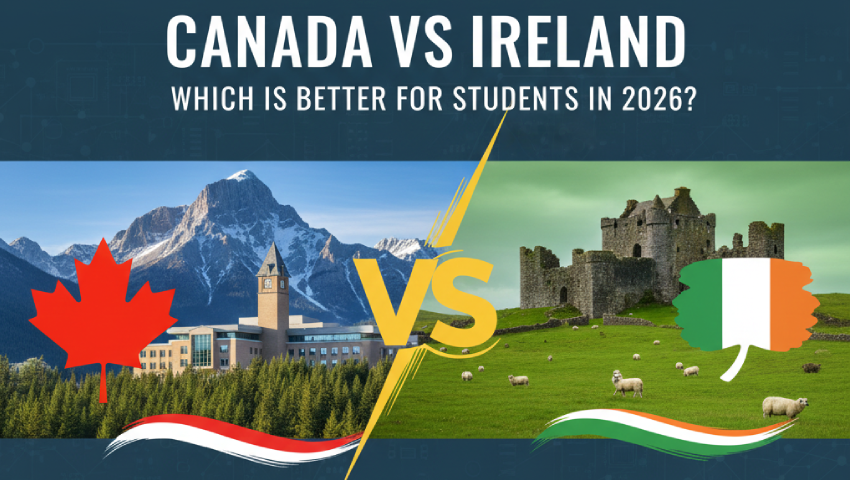Choosing the right study destination is one of the most important decisions for any international student. For Indian students, Canada and Ireland have emerged as leading choices due to their strong education systems, multicultural environments, and global career opportunities. However, selecting between the two requires careful consideration of several factors, including tuition fees, study in Ireland cost, visa processes, post-study work options, and career prospects.
Whether you choose to apply independently or seek guidance from professional study abroad consultants, understanding these nuances can make your decision smoother and more informed.
Why Canada and Ireland are Popular Among Indian Students
Both Canada and Ireland have steadily gained popularity among Indian students. Here’s why:
- Quality Education: Canadian universities such as the University of Toronto, University of British Columbia, and McGill University are globally recognised for their research and academic rigour. Similarly, Irish institutions like Trinity College Dublin, University College Dublin, and University of Limerick offer strong academic programmes with international recognition. Students interested in business studies can also explore top MBA programmes in Ireland that combine global perspectives with local expertise.
- Cultural Diversity: Canada’s multicultural environment provides a welcoming space for international students, while Ireland offers a friendly, English-speaking environment with a vibrant student community.
- Post-Study Opportunities: Both countries provide post-study work visas that allow students to gain international work experience, which is often a pathway to permanent residency in Canada or long-term employment in Ireland.
Tuition Fees: Canada vs Ireland
Tuition fees are a major consideration when planning to study in Ireland or Canada for Indian students.
| Country | Average Tuition Fees (Indian Students) | Notes |
| Canada | CAD 20,000–35,000 per year | Fees vary by programme; professional courses like MBA or Engineering tend to be higher. |
| Ireland | €12,000–22,000 per year (~USD 13,200–24,200) | All universities in Ireland are public and generally offer lower fees as compared to Canada for undergraduate and Master’s programmes for International students. |
Insight: While Canada’s tuition fees are higher on average, it offers a wider range of scholarships and assistantships. Irish universities are more affordable, making studying in Ireland cost manageable, but scholarship opportunities may be limited compared to Canada. Study abroad consultants can help students identify suitable scholarships in both countries.
Cost of Living: A Key Factor
Living expenses are another critical aspect. Canada is known for higher living costs, particularly in cities like Toronto and Vancouver, whereas Ireland can be relatively more affordable, depending on the town.
| Country | Average Monthly Living Costs | Key Expenses |
| Canada | CAD 1,200–1,800 | Accommodation, groceries, transport, and personal expenses are more expensive in major cities. |
| Ireland | €800–1,400 (~USD 880–1,540) | Rent, food, transport, and social activities; Dublin is the priciest city. |
Tip: Planning your budget carefully and exploring shared accommodation options can help manage costs. Ireland study abroad consultants can guide students on realistic budgets and city-wise cost comparisons.
Admission Process and Eligibility
Both countries have clear admission requirements, but there are slight differences:
- Canada: Students need strong academic records and English proficiency (IELTS or TOEFL), and may be required to take specific entrance tests depending on the programme. The application process involves direct submission to universities.
- Ireland: Indian students can apply directly to universities or seek assistance from trusted Ireland study abroad consultants like NewStrides. Required documents include academic transcripts, English proficiency scores, letters of recommendation, and a statement of purpose. Students looking for postgraduate studies can explore masters in Ireland or MBA in Ireland programmes, which have tailored admission criteria.
Insight: Working with consultants can help streamline the application process, ensuring all deadlines and document requirements are met.
Post-Study Work Opportunities
Gaining international work experience is often a priority for students.
| Country | Post-Study Work Visa Duration | Key Points |
| Canada | Up to 3 years (Post-Graduation Work Permit) | Duration depends on the length of study; work experience counts towards permanent residency. |
| Ireland | 1–2 years (Third Level Graduate Scheme) | Allows graduates to gain valuable work experience; some sectors have a high demand for skilled professionals. |
Insight: Canada’s work visa duration is generally longer, making it more suitable for students considering permanent residency. Ireland offers targeted work opportunities, especially in IT, finance, and healthcare.
Career Prospects and Immigration Pathways
Understanding career prospects and immigration pathways is crucial for planning your future after studying abroad.
- Canada: Strong demand for skilled professionals, especially in technology, engineering, and healthcare. Canada’s Express Entry system allows international students to transition to permanent residency after gaining relevant work experience.
- Ireland: Rapidly growing economy with opportunities in IT, pharmaceuticals, finance, and engineering. Studying in Ireland for Indian students can lead to work experience that enhances career growth. Ireland’s immigration pathways for students are more limited compared to Canada, but offer smooth work permit options post-study.
Tip: Students aiming for long-term settlement might prefer Canada, while those focused on gaining international exposure with shorter-term employment can consider Ireland.
Visa Approval Rates
Ireland has a strong student visa approval rate in 2025, sitting around 95% to 97%. Students who have a clear study plan and proper financial documents usually do well. Indian students also report an approval rate of about 96%, making Ireland a friendly option for international applicants.
Canada, on the other hand, has seen a significant drop in approvals. In 2025, many Indian student applications were rejected, with refusal rates rising to about 74%–80%. This increase comes from stricter checks on financial proof and the overall authenticity of applications.
Because of this significant gap, Ireland offers a much simpler, smoother visa process compared to Canada’s tougher screening in 2025. This is something students should keep in mind when choosing where to apply.
Lifestyle and Student Experience
Lifestyle and campus life can influence your overall experience.
- Canada: Offers multicultural campuses, a wide range of student clubs, recreational activities, and winter sports. Students experience diverse cultural events and networking opportunities.
- Ireland: Known for its friendly locals, vibrant pub culture, festivals, and strong emphasis on student support services. Smaller class sizes in some universities allow closer interaction with faculty. Studying in Ireland ensures students get a balanced combination of academic rigour and community engagement.
Scholarships and Financial Support
Financial support can significantly reduce the cost burden. Both countries offer scholarships:
- Canada: Universities and government bodies provide merit-based scholarships, research assistantships, and programme-specific grants.
- Ireland: Universities offer partial tuition waivers and merit scholarships. Institutions like Trinity College Dublin and the University of Limerick have dedicated scholarships for high-performing international students pursuing a master’s in Ireland.
Health Insurance Requirements
Both countries require students to have health coverage:
- Canada: Provincial health plans cover some students, but many need private insurance.
- Ireland: Students must have private medical insurance or be covered by the university’s health scheme.
Comparison Table: Canada vs Ireland
| Factor | Canada | Ireland |
| Tuition Fees | CAD 20,000–35,000 | €12,000–22,000 (~USD 13,200–24,200) |
| Living Costs | CAD 1,200–1,800/month | €800–1,400/month (~USD 880–1,540) |
| Language | English/French | English |
| Post-Study Work Visa | Up to 3 years | 1–2 years |
| Permanent Residency Pathway | Yes, via Express Entry | Limited options |
| Scholarships | Extensive | Moderate |
| Student Life | Multicultural, larger campuses | Friendly, close-knit, vibrant |
| Career Opportunities | Technology, healthcare, and engineering | IT, finance, pharmaceuticals |
| Ease of Application | Direct, can use consultants | Direct or via NewStrides |
| Postgraduate Options | MBA and Master’s available | Master’s in Ireland, MBA in Ireland available |
Conclusion
Both Canada and Ireland offer excellent opportunities for Indian students. Canada provides extended post-study work options and potential pathways to permanent residency. Ireland offers affordable tuition, quality education, strong career prospects, including popular MBA and master’s programs, and a predefined permanent residency route known as Stamp 4, allowing graduates to live and work without employment permits. Visa approval rates also vary between the two countries, which should be considered alongside career goals, budget, and lifestyle preferences.

Priya Kaur is an Assistant Vice President at NewStrides Consulting Pvt. Ltd. With over 18 years of experience in overseas education, she specializes in counseling students for UK and Ireland education. She has visited universities and explored these countries to provide prospective students with insightful guidance and accurate information to make informed decisions for their educational journeys. Her career reflects a commitment to excellence in consulting.



